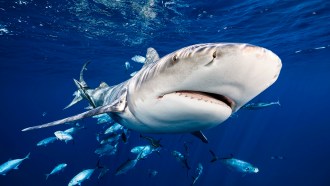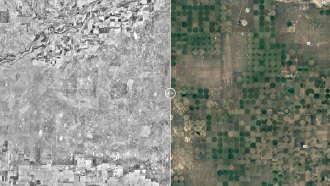Brianna Randall
Brianna Randall is a freelance writer based in Missoula, Montana.

Trustworthy journalism comes at a price.
Scientists and journalists share a core belief in questioning, observing and verifying to reach the truth. Science News reports on crucial research and discovery across science disciplines. We need your financial support to make it happen – every contribution makes a difference.
All Stories by Brianna Randall
-
 Animals
AnimalsHere’s how many shark bites there were in 2023
The chance of being bitten by a shark is still incredibly slim, according to a new report from the Florida Museum of Natural History.
-
 Life
LifeThe Endangered Species Act is turning 50. Has it succeeded?
After 50 years, this landmark law has kept many species alive — but few wild populations have recovered enough to come off the “endangered” list.
-
 Environment
EnvironmentLandscape Explorer shows how much the American West has changed
The online tool stitches together historical images into a map that’s helping land managers make decisions about preservation and restoration.
-
 Environment
EnvironmentDust from a shrinking Great Salt Lake may be accelerating Utah’s snowmelt
About a quarter of the record-breaking, snow-melting dust on the Wasatch Mountains in 2022 may have come from exposed lakebed at Great Salt Lake.
-
 Animals
AnimalsThis marine biologist is on a mission to save endangered rays
Jessica Pate and the Florida Manta Project confirm that endangered mantas are mating and sicklefin devils are migrating along the East Coast.
-
 Earth
EarthThe Great Salt Lake is shrinking. What can we do to stop it?
A dropping lake level affects agriculture, public health and the environment — but water conservation can halt the decline.
-
 Oceans
Oceans‘Jet packs’ and ultrasounds could reveal secrets of pregnant whale sharks
Only one pregnant whale shark has ever been studied. New underwater techniques using ultrasound and blood tests could change that.
-
 Animals
AnimalsTree-climbing carnivores called fishers are back in Washington’s forests
Thanks to a 14-year reintroduction effort, fishers, or “tree wolverines,” are once again climbing and hunting in Washington’s forests after fur trapping and habitat loss wiped them out.
-
 Plants
PlantsInvasive grasses are taking over the American West’s sea of sagebrush
Cheatgrass and other invasive plants are expanding rapidly in the western United States, putting more places at risk for wildfires.
-
 Ecosystems
EcosystemsSimple hand-built structures can help streams survive wildfires and drought
Building simple structures with sticks and stones — and inviting in dam-building beavers — can keep water where it’s needed to fight drought and wildfires.